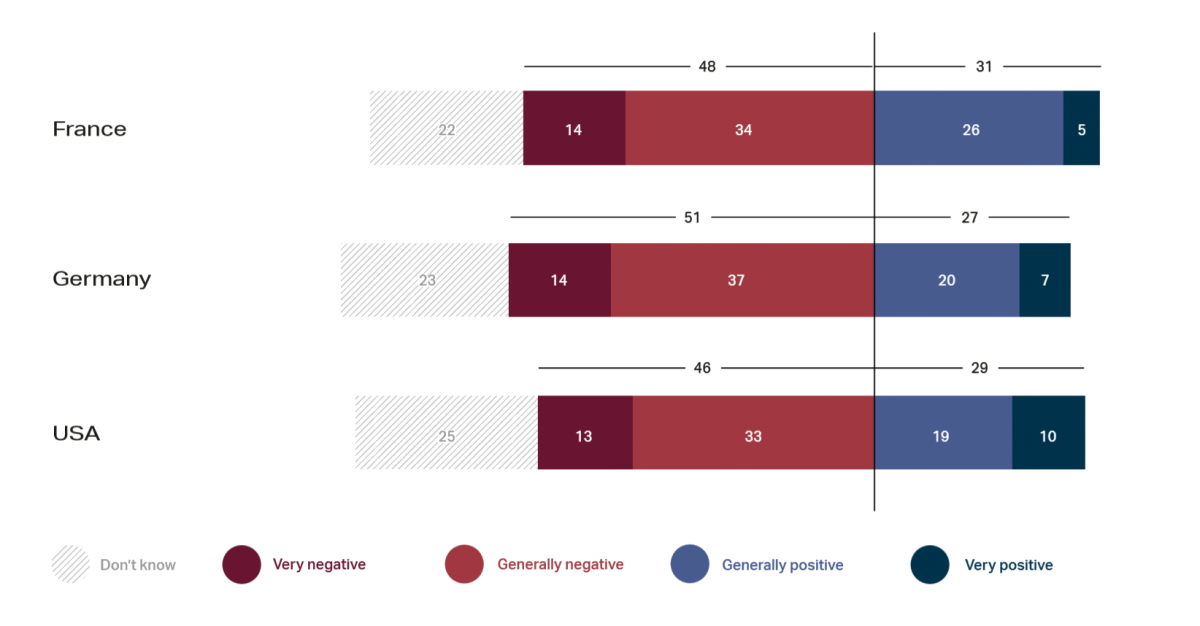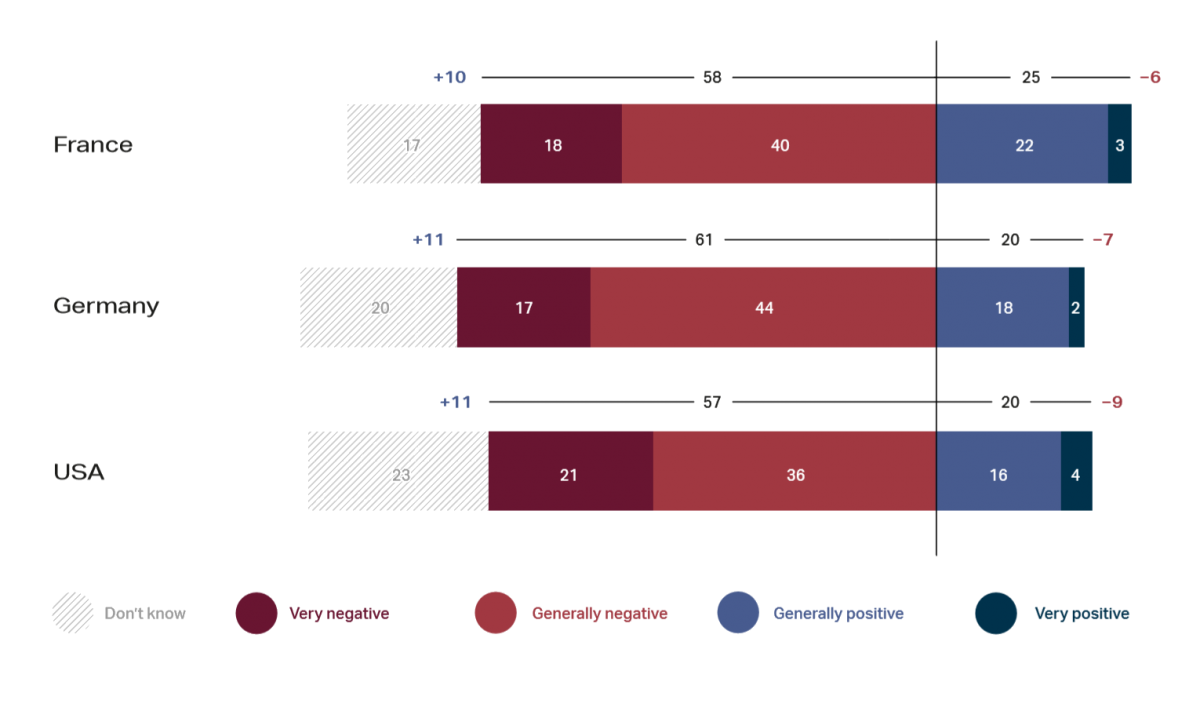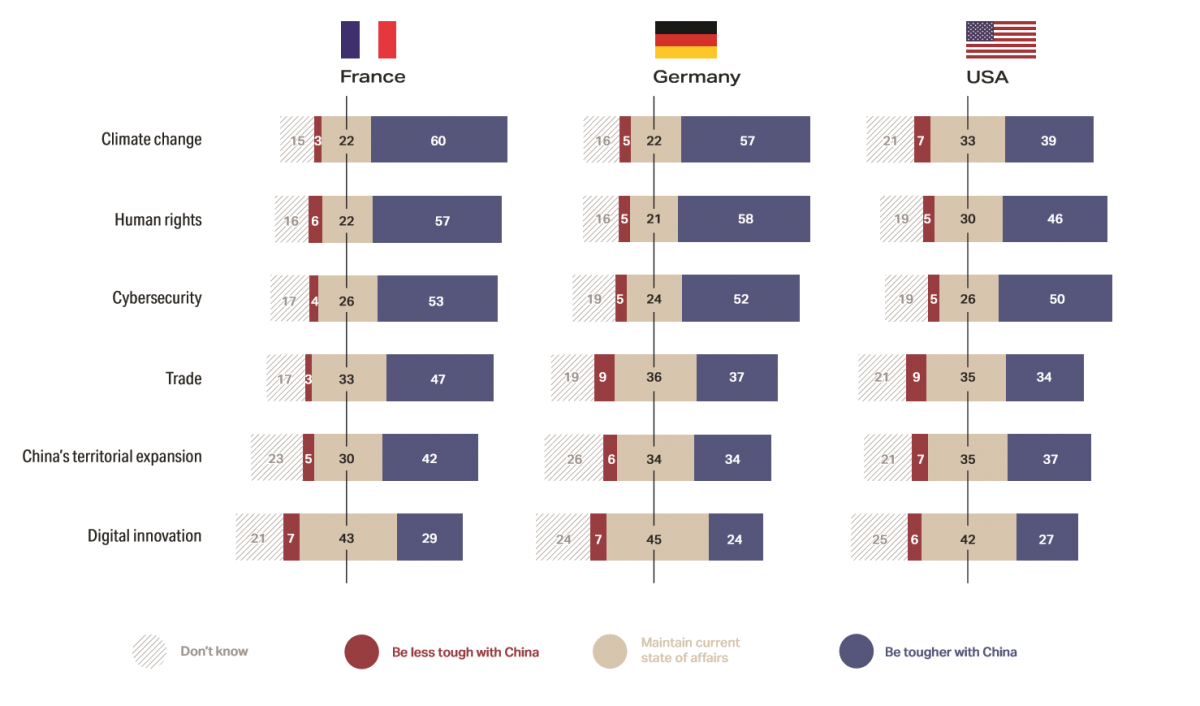Transatlantic Relations 2020: Relations with China
How do you feel about China’s rising influence in global affairs?
In the January survey, nearly half of respondents in each country characterized China’s rising influence as negative. In the wake of the pandemic, negative views of China’s rising influence have increased by 10 percentage points or more across all three countries.
Only about a year ago, China was designated a "systemic rival" to the EU after 15 years of "strategic partnership," and the U.S.-EU dialogue on China continues to be strengthened. It seems the conflicts with China and tensions between transatlantic partners regarding China in the areas of trade and technology have made their way into the public consciousness. About half of American, German, and French respondents found China’s rising influence to be a negative development (48% in France, 50% in Germany, 46% in the United States). A bit more than a quarter of respondents viewed Beijing's growing clout positively (27-31%), while a quarter of respondents, (22-25%) could not say if this development was positive or negative.
In all three countries, there was a generational divide on the issue. Young respondents (ages 25-34) were more open to Chinese influence, with 40% in France and the United States and 36% in Germany saying they felt positive or very positive about China’s rise. In contrast, the majority of respondents age 55 and older in all three countries viewed China’s rising influence negatively (58% in France, 60% in Germany, 65% in the United States). In Germany, a negative view of China’s rise carried across most parties, with Green and Christian Democrataligned respondents having the highest negatives (61% of CDU/ CSU and 65% of Greens). In France, positive views were highest among the conservative-liberal Republicans (44% percent), and in the United States, a slim majority of Republicans and independents viewed China's growing influence negatively, 51% versus only 44% of Democrats.
How do you feel about China’s rising influence in global affairs?

BEFORE COVID-19
Sample: France 1004; Germany 1001; USA 1001. Expressed in % rounded up to the next unit for decimals .5 and higher.
Four months later, after the coronavirus had put Europe and the United States in lockdown, negative views of China’s rising influence have increased significantly, by double digits.
Now a clear majority in all three countries have an adverse view of China's ascent: in France, negative views are up 10 points to 58%; in Germany up 10 points to 61%; and in the United States up 11 points to 57%. The fall in total positive views are down by slightly smaller margins (-9 points in the United States, -8 in Germany, and -6 in France). Additionally, fewer respondents are unsure in May whether China’s influence is positive or negative (down by 4 points in France but only 2 in the United States).
In all three countries, fewer young respondents still find China’s rising influence to be a positive development (among ages 25 to 34 in France -6 points to 34%; in Germany -15 points to 21%; and in the U.S. -12 points to 28%). Negative views among older respondents (55+) across each country have also climbed (by 12 points in France to 70%; by 7 points in Germany to 67%, and by 13 points in the United States to reach 78%). The rise in negative views of China’s influence runs across the political spectrum of all countries, with the highest percentage of negative views among U.S. Republicans (66%).

AFTER COVID-19
Sample: France 1000; Germany 1001; USA 1000. Expressed in % rounded up to the next unit for decimals .5 and higher.
Should your country take a tougher or softer approach to China?
French respondents were most likely to want a tougher approach to China. Americans were least likely to favor getting stricter, but this might be because Washington has already confronted China more than its European allies, especially in the areas of trade and security.
On the subject of cybersecurity, respondents from all three countries are closely aligned, with about half of French (53%), Germans (52%), and Americans (50%) in favor of a tougher approach. Few respondents (less than 10% across the board) want a more indulgent stance toward China on any issue. At the same time, many French, Germans, and Americans are uncertain about the appropriate approach for their respective country to take. Between 15 and 26 percent of respondents said they did not know what their country should do.
Despite an ongoing multi-year trade war between the United States and China, only a small minority of American respondents (9%) reported wanting the United States to be “less tough” toward China on trade. Most advocated maintaining the current policies (35%) or getting tougher (34%). German views on trade with China were nearly identical to Americans’, with an even split between maintaining current policy (36%) and adopting a stricter approach (36%), and were similarly split on China’s territorial expansion.
In all three countries, there is majority (50-53%) support for tougher approaches to China on cybersecurity, but in France and Germany respondents think their governments’ need to be more demanding with Beijing especially on climate change and human rights (57-60% want a tougher approach). In contrast, among Americans, only slightly more preferred a tougher approach to the status quo on climate change (39% tougher, 33% maintain) and only 46% think a tougher approach on human rights is necessary (46% tougher, 30% maintain).
With the exception of digital innovation, French respondents support a more unflinching approach to China across the board. Germans are content with the status quo in the digital sphere and divided on trade, but want a tougher approach to Beijing in the areas of human rights, climate change, and cybersecurity.
Recent years of tension between the U.S. and China, especially in the areas of trade, digital innovation, and security in China’s neighborhood, may have left Americans thinking the current line is tough enough.
How do you think if your country should approach China regarding the following issues?

Sample: France 1004; Germany 1001; USA 1001. Expressed in % rounded up to the next unit for decimals .5 and higher.